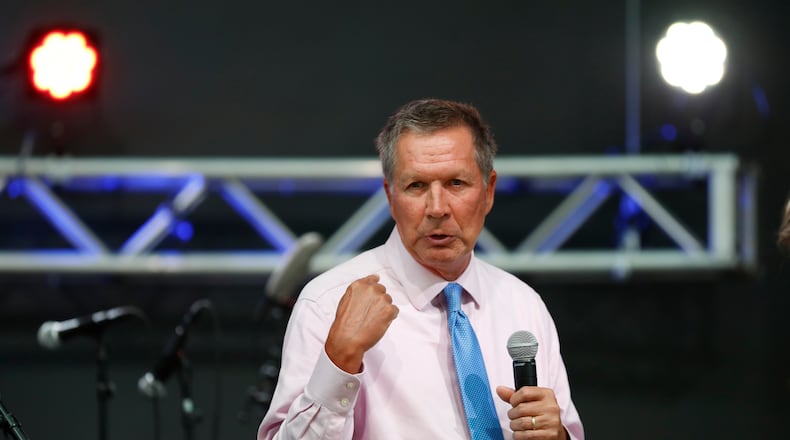CLEVELAND -- Ohio is indeed a battleground state in this year's presidential contest. It's just not the battle that Republicans wanted. Or needed.
In a sense, the Republican National Convention has been under siege this week. Donald Trump holds the fortress — the Quicken Loans Arena where the fourth and final day of the GOP gathering is about to play out.
With a few unfortunate exceptions, Trump and the party’s top officials have maintained control of the TV imagery on the inside. A sizable majority of 5,000 troops within the walls of “the Q” are loyalists. But not all. The rebellious and those under suspicion have been exiled to the outer edges of the hall.
But Trump does not control the geography outside his fortress, as John Kasich has made clear.
The governor of Ohio, the last GOP presidential candidate in the race against Trump and the most prominent refusnik of the field, has danced and dodged around downtown Cleveland, appearing and disappearing as he chooses. Kasich hasn’t said enough to offend the fortress Republicans — but his very presence is an uncomfortable reminder to Trump that his hold on GOP voters isn’t as firm as he might like.
“I don’t hold any personal animus towards Donald Trump. We just are two companies that have different values, different directions, and different philosophies,” he told an NBC camera this week, before disappearing again.
If there weren’t so many monuments to Union soldiers here, one would be tempted to compare Kasich to hit-and-run cavalryman Jeb Stuart of Confederate background.
Kasich’s schedule, we’re assured, is devoted to assisting Ohio’s down-ballot Republicans. But his attitude has proven contagious. Rob Portman, Ohio’s endangered Republican senator, has endorsed Trump — but has managed to establish his own campaign schedule entirely outside “the Q.”
If you live in Georgia, which changes political direction only once every other generation or so, it is difficult to conceive of Ohio’s swing-state importance in Republican mythology.
No GOP president has won the White House without winning Ohio. None. As in zero.
So when a Republican governor of Ohio refuses to endorse the Republican presidential nominee, refuses to even enter the arena where his party has convened — it matters a great deal.
The Trump campaign understands this. As the RNC began, some of the first words out of the mouth of Paul Manafort, chairman of the Trump campaign, were a condemnation of Kasich.
“He’s embarrassing his party in Ohio,” Manafort said.
That needs to be balanced against a New York Times report that surfaced Wednesday, about a May offer the Trump campaign allegedly made to Kasich, offering him a vice presidency in charge of domestic and foreign policy.
What, a Kasich advisor, would be President Trump’s job? “Making America great again,” was the alleged reply.
In reality, Trump has faced two rebellions in Cleveland. The one in “the Q,” largely contained, has had at its core social conservatives distrustful of the billionaire’s religiosity — augmented by those who want a decentralized Republican National Committee and a less powerful chairman Reince Priebus.
U.S. Sen. Ted Cruz of Texas, one of Wednesday evening’s speakers, seeks to become the pre-eminent leader of that faction – should Trump falter in November.
Kasich is more representative of the Republican wing that has chosen not to show up this week — the Bush family, Mitt Romney, John McCain, and Lindsey Graham. Especially that part of the GOP that has taken pride in its foreign policy expertise, and is now worried about what impact a Trump presidency would have on the nation’s place in the world.
Many of Kasich’s spot appearances have been content free, or close to it. “If we can make a difference in the lives of the people and give them hope, and give them the sense that together we can change this whole darned world, we can be the very best,” he told a long-suffering crowd waiting for him at the Rock and Roll Hall of Fame on Tuesday.
But just before that stop, the Ohio governor dropped by a meeting of the International Republican Institute. Kasich spoke for 15 minutes, and never mentioned Trump by name. He merely declared himself in opposition to everything that the Republican presidential nominee stands for in the realm of world relations.
“I see growing nationalism. There’s nothing wrong with nationalism until it becomes extreme. We all love our countries. But you know, we know what growing nationalism to an extreme amount can mean,” Kasich said.
He noted the trend toward isolation, and expressed disappointment that the Republican national platform didn’t include strong support for those trying to keep Russia out of Ukraine.
"The alliances. We think NATO doesn't matter? Are we kidding? What would we put in its place? And what are we supposed to tell everybody — to be on their own? What about the Russians? Look at Brexit — who was the happiest man in the world with Brexit? Vladimir Putin," the governor said.
The U.S. will miss Britain’s influence within the European Union, Kasich said. “The Brits were the strong voice in terms of the kinds of things we care about on global security. Now, their voices are going to be muted.”
So far, none of these sentiments have found a place on the stage in the “the Q.” The story is likely to be the same tonight.
Where is this headed? Kasich’s schedule for Wednesday showed a late afternoon session with Republicans from New Hampshire.
Some might say that such hints of a 2020 race for the presidency by the governor of Ohio presumes a Trump defeat in November.
Not necessarily. John Kasich’s behavior this week says that a President Trump in January could make a 2020 run for the White House more likely. Not less.
About the Author
The Latest
Featured




